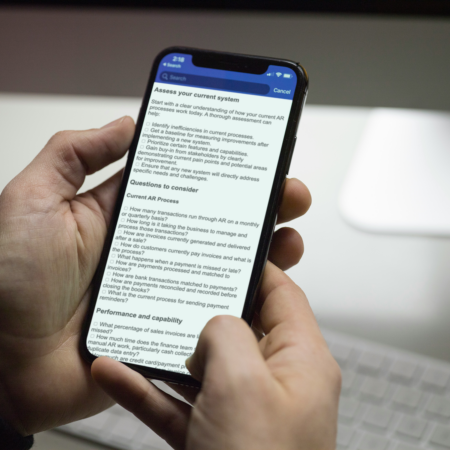
Your sales team is bringing in more revenue. You’re expanding your operation. Maybe you’re in the middle of a massive hiring push or acquired a new office building or warehouse. All this change involves more money, more debits and credits to track and account for. As you grow, even before you really grow, you have to question whether you can handle the finances supporting and resulting from this growth. Technology provides a solution.
Odds are, if any of these scenarios apply to you, you may want to consider investing in Enterprise Resource Planning (ERP) accounting software. Let’s break down exactly what an ERP accounting software system is and how it helps.
Where Does ERP Accounting Software Fit In?
There’s a lot of terminology associated with accounting technology. Terms like accounting applications and platforms seem to be used interchangeably – when they are not the same at all. But where does ERP fit in? To answer this let’s look at the two core types of accounting software.
Accounting Applications
An accounting application’s goal is to just help you manage your accounting. It’s equipped with important, but basic, tools to do so. An app may allow you to customize some aspects of your accounting process, but this tends to be limited. Some of these customizations might be adding a data field or automating a small number of tasks with scripts or macros. However, this usually doesn’t fully satisfy more overarching business needs. You’ll be able to access functions and perform key processes, but generally, you’re restricted to the framework of the accounting application.
Accounting Platforms
An accounting platform goes just beyond an IT framework, it’s also a toolset letting you dictate how you use the technology. An accounting platform is an IT stack of technology designed specifically for you to build on top of it. IT platforms are designed to be tailored according to user needs. With accounting platforms, you’ll have basic accounting system functions but also features with more advanced ways to control the overall system. Accounting platforms let you easily add unique custom data tables, data fields, user interfaces, and automation relevant to your precise operation. Accounting platforms grow with you and fulfill your needs as you grow while applications usually just solve current or conventional problems.
So, What Is ERP Accounting Software?
ERP accounting software is an accounting platform. The ERP is an IT stack that supports a variety of business functions like operations and specialized industry functions like manufacturing tasks, or accounting itself.
ERP accounting software is designed to streamline the digital accounting process in a way that users can scale their operations more effectively through custom accounting solutions. As a platform, this software is meant to be built on top, growing with your needs instead of only meeting core criteria. Let’s look at how Accounting Seed, an accounting ERP compares to typical a accounting app like QuickBooks.
Comparing Accounting Seed VS QuickBooks
Both Accounting Seed and QuickBooks offer accounting features and functionality. They are both geared to help you manage accounting processes and track debits and credits, so the goals are similar. But the scope in how each solution equips you to manage accounting lifecycles is what sets the two solutions apart. Here’s a short breakdown.
- As an accounting ERP, Accounting Seed simply has more out-of-the-box tools.
Specifically, it has platform-based functions focused on communication and security, features that not only enhance and streamline the collaborative process of accounting but also protect your data. - ERPs like Accounting Seed provide more features around setting up and implementing tailored tasks and sequences on their own.
QuickBooks is more hands-on and sticks to a more lean features offering. - Because the accounting ERP is designed to scale and grow, the potential for automation is more substantial than an accounting application.
This means they dramatically reduce the manual, repetitive work you’re forced to do in conventional accounting.
When Would Switching To An Accounting ERP Be Practical?
Accounting applications like QuickBooks typically work best for small-to-medium-sized companies that are just starting out or are not actively growing. Growth and complexity are key factors in determining the type of accounting solution you use. As your business takes on more work, products, projects, and staff, the financial dimension of your organization grows. This means that you’re creating more debits and credits to handle for billing and accounts payable. But additionally, as you grow, your business needs to be more strategic with financial management in order to grow and thrive. For this, you really need an ERP accounting platform.
What Makes A Strong Accounting ERP?
There are several ERP accounting software solutions in the IT market. Besides a cost though, there are critical factors to consider when choosing the product that best suits your needs. In the accounting ERP world, flexibility, resilience, and scalability are chief priorities.
Think about it. Investing in an ERP that is overly complicated and difficult to adjust to make your individual accounting process easier, brings the same limitations of a typical app. Flexibility, specifically customization and configuration, is important for the solution to grow with your needs.
Creating your own software requirements specifications will help you pinpoint the ERP most fit for your business. If the solution cannot do this, look elsewhere. Here are some central qualities that define a strong accounting ERP:
- Flexible | Easily configurable and customizable, grows with you
- Collaborative | Enables a 360-degree view of your business
- Connected | Effectively links mission-critical business applications and banks
- Trusted/Reliable | Used strong API and the system has good reputation
- Automated | Eliminates manual entry and multiple systems
Your Dedicated ERP Accounting Software: Accounting Seed
Built on the flexible, secure Salesforce Platform©, Accounting Seed is a dedicated accounting ERP designed to fully function and connect with other solutions on Salesforce. Accounting Seed focuses on giving you full command of the accounting life cycle. Our native flexibility and focus on accounting automation let you not only scale, but have greater data accuracy, and the peace of mind that comes with it.
A native Salesforce accounting app, Accounting Seed, provides a full 360-degree view of your business’ performance to help you and your team make the best decisions possible. Not on Salesforce? Our software can be customized to work with any system you have through a reliable connection.
See Accounting Seed in action
Get a close-up view of how accounting on Salesforce can eliminate the need for costly integrations—and silos of mismatched information—by sharing the same database as your CRM.


